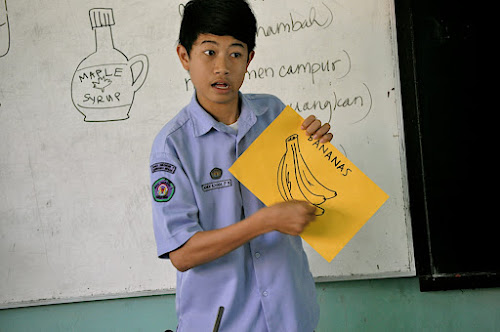
Living in Indonesia, I’ve found occasion to face down my two most harrowing, nightmare inducing childhood fears: great white sharks and tidal waves. Now, sharks and tidal waves are both enormous and scary deadly forces that lurk, in one form or another, in the depths of tropical oceans such as, for example, the South Pacific. It’s one thing to assure yourself that you’re safe from both sharks and tidal waves whilst swimming in Lake Washington; it is quite another matter to ignore such fears when paddling atop a surfboard on a tropical reef in the middle of the Indonesian archipelago.

Awful as the latter may sound to a person prone to morbid speculations involving shark attacks, this is how I spent my Eid al-Adha vacation: Alison and Ben, two Fulbright kids working in Mataram, came over to Sumbawa to try their hands at surfing with Doug and myself. Eid al-Adha, or the festival of sacrifice, is a holiday observed by Muslims the world over; like any respectable festival of sacrifice, Eid al-Adha involves a lot of throat slitting and blood letting—let’s just say this is not a good day if you've got four hoofed legs. After the ritual slaughtering of three cows in my school courtyard, the four of us trekked way down south where they make the roads impossibly steep (for real, think roller coasters climbing through the jungle) and the beaches pretty.
And by pretty I mean something between breathtaking and holy shit; shark and tidal wave potential aside, this is not a bad place to stage a few days of haphazard surfing attempts. My Toms—which have been stinking up my suitcase since I failed to wash them clean of Jakarta sludge one afternoon in September—made a comeback as some super awesome reef booties (second only to Alison’s five fingers; see Seattle granola style). On balance, we all managed to look like legitimate surfers—that is, while strutting down the beach with our surfboards—without sustaining too many injuries: one bee sting, one dislocated shoulder and a few Dengue mosquito bites are a seemingly small price to pay for the adrenaline loaded satisfaction of standing up on a wobbling board for the first time. At the very least, none of these afflictions were related to three rows of razor sharp teeth prowling the shallows.

As we honked our way around indifferent livestock on the road home, contentedly smelling of insect repellent and seawater, Ben posed this Fulbright worthy question: “if you yell oh my God as you’re running over a goat, does that mean it’s halal?”
Sounds like a debate for the ulama, Ben.















































